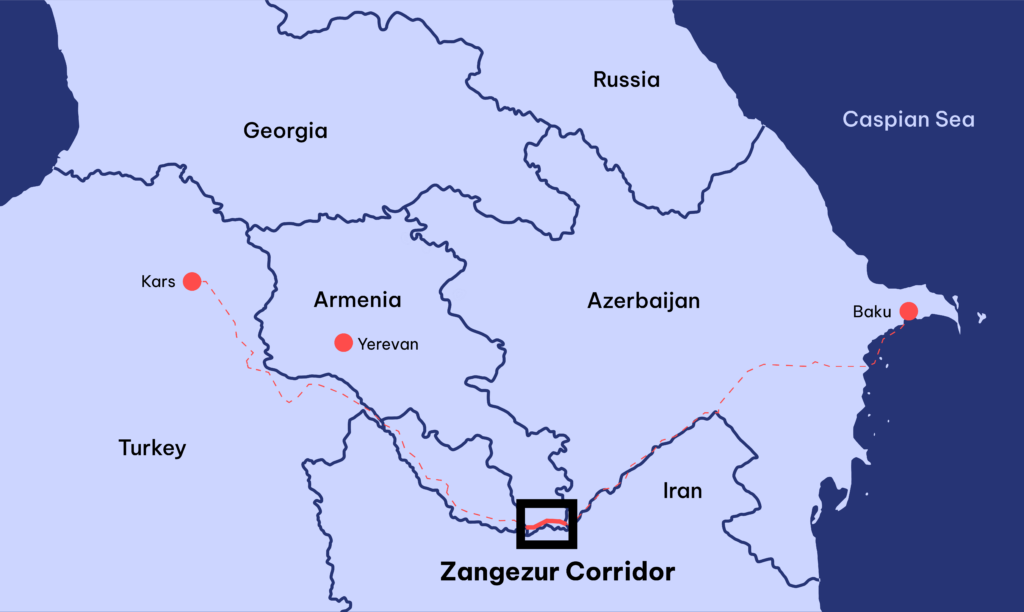Today Jerusalem is all-in on Baku. The Israeli media repeatedly publish fawning accounts by analysts who participate in Azerbaijani junkets and partake in caviar diplomacy. But what happens to Israel-Azerbaijan bilateral relations if the partnership actually succeeds in ending Iran’s Islamic Republic?
The 30-year partnership is based on a swap of arms for energy, paying dividends to both countries. Azerbaijani oil accounts for between 40 and 60 percent of Israel’s consumption. Israeli weapons, meanwhile, gave Azerbaijan a qualitative edge that it used to great effect against Armenia, wresting control over Nagorno-Karabakh after 35 years of Armenian administration. Those same Israeli arms, in theory, might also help deter any Iranian action against Azerbaijan.
Perhaps the greatest factor shaping Israel’s embrace of Azerbaijan is Israel’s calculation that the Islamic Republic of Iran represents Israel’s greatest strategic challenge. Israeli officials are not wrong: Senior Iranian regime officials not only call for Israel’s destruction, but act upon it. Peaceful nuclear programs need not be built with secret centrifuge cascades buried deep under mountains nor do countries intent on peace and coexistence sponsor terror proxy groups from Lebanon to Gaza and from Iraq to Yemen.
Azerbaijan’s 766-kilometer border with Iran, in theory, provides Israeli agents an ability to infiltrate. In reality, this oft-cited reason may be less important than Azerbaijan’s willingness to host listening stations and allow Iranians to leave their country to meet with Israelis. Iraqi Kurdistan’s border with Iran is about 500 kilometers long and far more porous and more conducive to infiltrate agents. But the Islamic Revolutionary Guard Corps also operates openly in Iraqi Kurdistan. Thus the Kurdistan Region of Iraq is not safe for permanent offices or facilities.
When Israel smuggled out Iran’s nuclear archives, they did so via Azerbaijan because, once across the border, they could be better assured of local government protection. In Iraqi Kurdistan, by contrast, when Patriotic Union of Kurdistan boss Bafil Talabani recently arrested his cousin and former intelligence chief Lahur Talabani, he first got permission from Tehran-backed Badr Corps leader Hadi al-Amiri.
Israel’s strategic calculus will change once there is regime change in Iran. Just as Israel relied on Iranian oil before the 1979 Islamic Revolution, so too will it likely return to the Iranian market. This will come at the expense of Azerbaijan for two reasons: First, Israel and many of its Western partners will want to support the new Iranian government as it tries to rebuild, recover, perhaps fight remnants of the former regime, and show a generation of Iranians indoctrinated by the Islamic Republic that orientation toward the West pays dividends. Second, Azerbaijani oil exports to Israel traverse Turkey, giving President Recep Tayyip Erdoğan the ability to cut off this export. If Iran’s regime changes, both Israel and perhaps Europe will seek to avoid the Turkish route and so find alternatives to Azerbaijan.
Indeed, after regime change in Tehran, Turkey will replace Iran as Israel’s greatest geopolitical foe and Baku’s permissive relationship with Ankara will become more problematic.
Heydar Aliyev, the former Soviet Deputy Prime Minister and father of Azerbaijan’s current president, described the relationship between Azerbaijan and Turkey as “one nation, two states.” When Turkey was a secular democracy in the 1990s, Azerbaijan as the doorstep to Turkey was an asset for Israel. Today, Israel must take seriously the frequent threats against it made by President Erdogan, and actions like a Turkish trade boycott. Thus what might matter in the future will be intelligence access to the Turkish border. Iran brings to the table a more than 500-kilometer frontier with Turkey. Azerbaijan, on the other hand, has only a 17-kilometer border with Turkey.
Azerbaijan’s advocacy for ethnic Azeris in Iran could also become a problem in a future Iran. The ethnic Azeri population of Iran is 50 percent greater than the entire population of independent Azerbaijan. It is a sensitive subject for Iranians, who have suffered scores of separatist movements over the last 150 years. Accepting Iranian unity will be non-negotiable for Iran’s new leaders. Israeli foreign policy has never been sentimental; rather, it is strictly realist. Forced to make a decision between Azerbaijan and post-Islamic Republic Iran, Israel will choose Iran.

The question today for Israel, then, as it doubles down on Azerbaijan is at what point will commitments made to Baku and contracts granted to Azerbaijani counterparts transform from assets to liabilities should Iranian Supreme Leader Ali Khamenei end his career in exile alongside Bashar al-Asad or on the gallows as Saddam Hussein.
As Iran’s 1979 Islamic Revolution and the 1991 collapse of the Soviet Union showed, key events often reshape the Middle East regional order. The Islamic Republic’s demise would be just as momentous and its second order effects will also be interesting. For instance, today’s enthusiasm for the East-West Zangezur corridor might become less important than a north-south corridor through Iran and Armenia.
For Washington and Jerusalem, short-term advantage is important, but long-term success also requires playing the long game.

